We reach more than 65,000 registered users in Dec!! Register Now
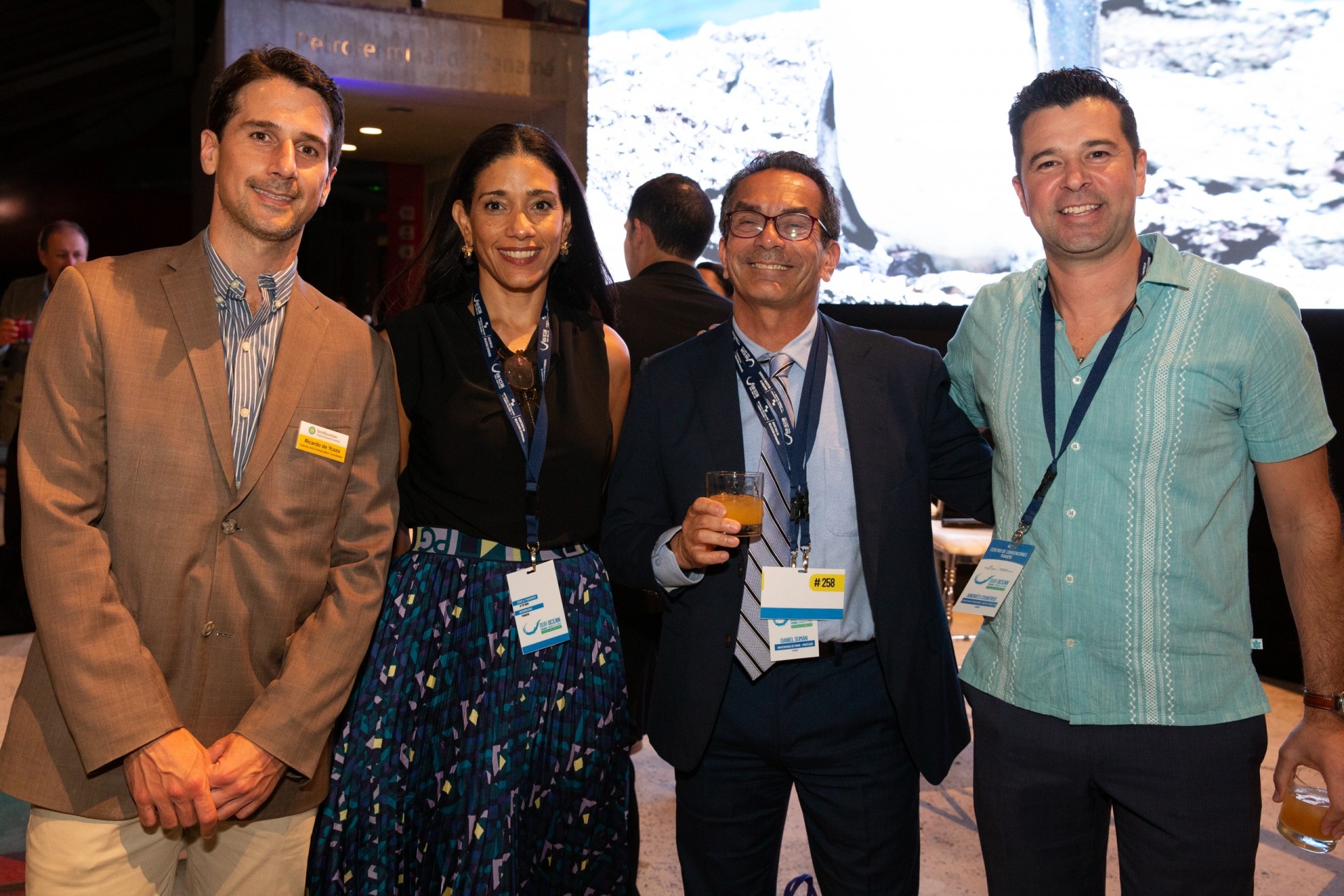
Ocean protectors - A tropical perspective on marine conservation
- July 07, 2023
- 3 Views
- 0 Likes
- 0 Comment
Multidisciplinary researchers from the global tropics published a new paper suggesting that the key to ocean conservation may lie with the tropical majority.
To achieve tangible solutions for ocean conservation, we should listen to the people who are most affected by the current problems facing the ocean: the people in the tropics, say 25 co-authors of “Engaging the Tropical Majority to Make Ocean Governance and Science more Equitable and Effective,” a new paper in the journal Ocean Sustainability, funded by the Smithsonian Tropical Research Institute (STRI).
“We can’t really talk about the ocean without talking about nature and humans,” said STRI staff scientist and founding director of the Adrienne Arsht Community-Based Resilience Solutions Initiative, Ana Spalding, lead author with marine ecologist and associate professor at Oregon State University (OSU) Kirsten Grorud-Colvert. “Kirsten and I have been working together to bridge those two aspects.” The tropics are home to most of the world’s biodiversity and the majority of directly ocean-dependent people. Credit: Jorge Alemán, STRI.
The tropics are home to most of the world’s biodiversity and the majority of directly ocean-dependent people. Credit: Jorge Alemán, STRI.
The goal of the paper was to take advantage of the focus on the tropics resulting from the Our Ocean Conference held in Panama in March 2023. Spalding and Grorud-Colvert assembled a group of multidisciplinary researchers from around the global tropics to discuss actionable solutions for ocean conservation. After initial brainstorming meetings on Zoom, they organized an in-person draft-writing workshop with a core group of collaborators in November 2022 at STRI’s Punta Culebra Nature Center in Panama City, Panama.
The objective was to discuss how to face the most urgent problems affecting the oceans, particularly in the global tropics. However, instead of focusing solely on the scientific aspect of marine conservation, a common theme during the initial discussions became the inequity in ocean governance and ocean science.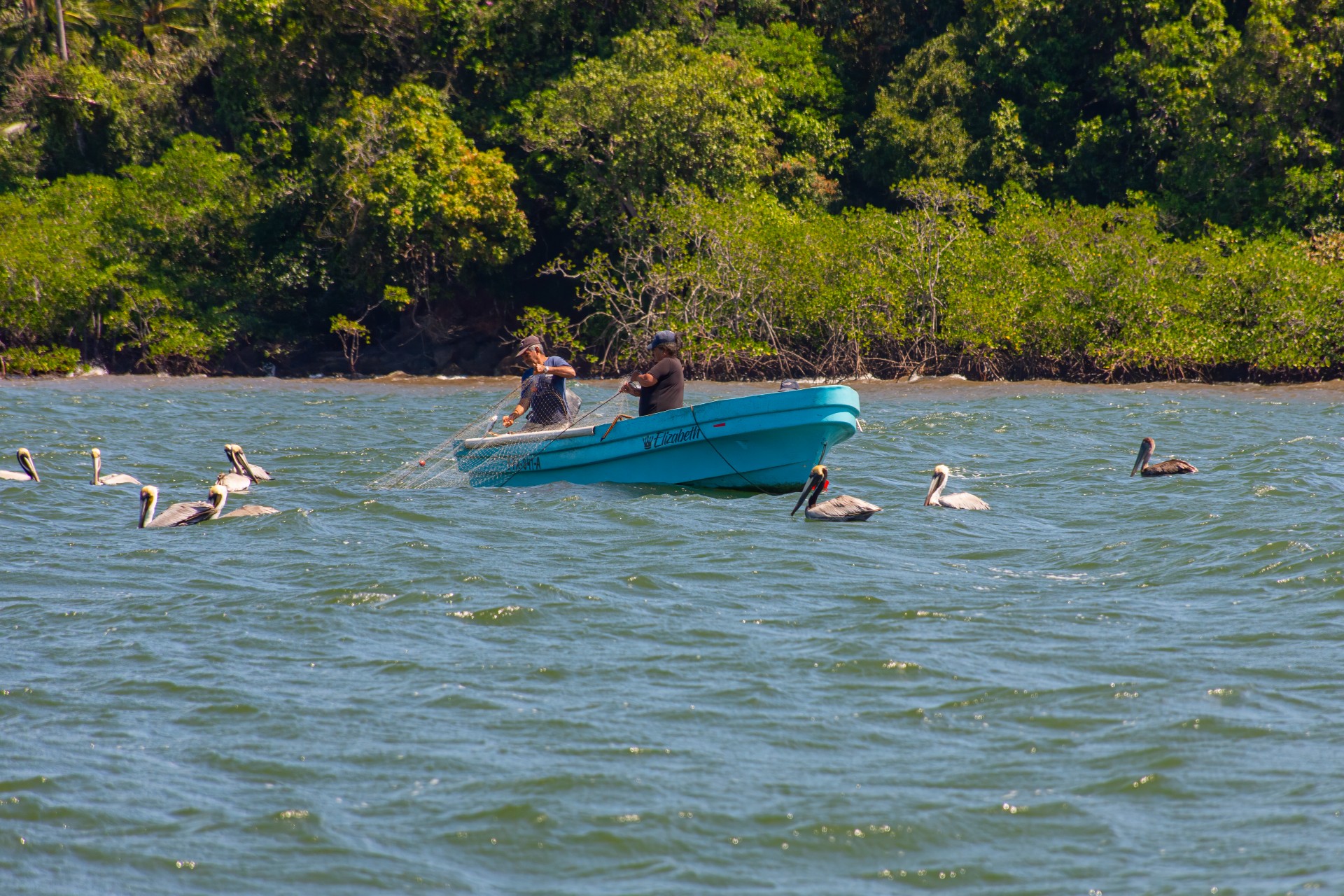 One of the four key actions proposed by the publication is centering equity in ocean science and governance, to empower community-based conservation and restoring Indigenous people’s rights. In the photo, fishers use traditional, small-scale fishing practices off the coast of Montijo along the Pacific Coast of Panama. Credit: Steven Paton, STRI.
One of the four key actions proposed by the publication is centering equity in ocean science and governance, to empower community-based conservation and restoring Indigenous people’s rights. In the photo, fishers use traditional, small-scale fishing practices off the coast of Montijo along the Pacific Coast of Panama. Credit: Steven Paton, STRI.
“The underlying tone was that systemic changes in inequity and access were important,” Spalding said. “We still incorporated the more technical science side of things, but that’s been written, that’s been talked about. We decided to prioritize this issue.”
The tropics are home to most of the world’s marine biodiversity and the majority of directly ocean-dependent people. But governance of the ocean is still dominated by high-income countries in temperate regions, where most of the scientific knowledge and funding originates. Policies are disproportionately established by policymakers outside of tropical regions.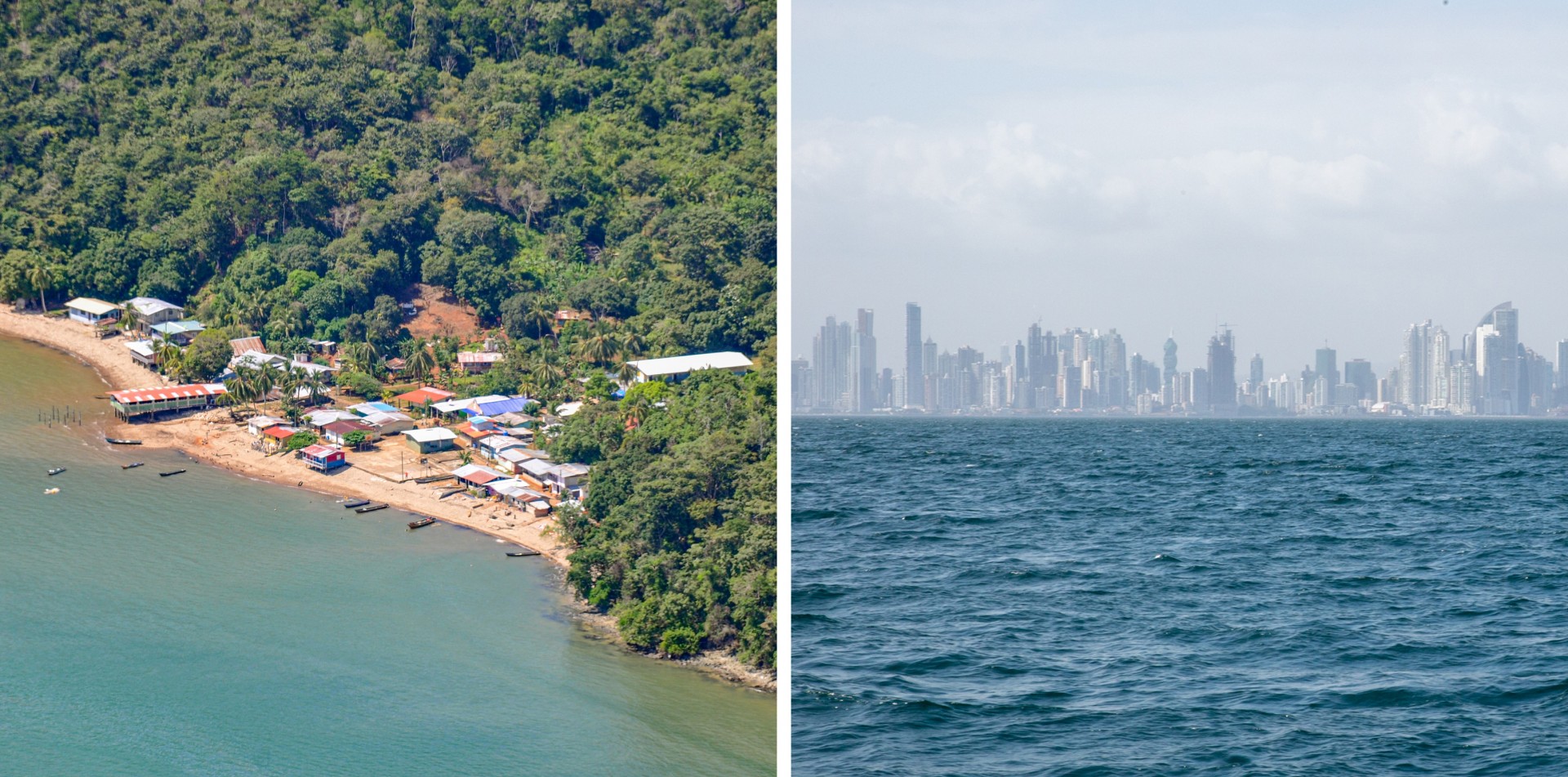 Another key action is to reconnect people and the ocean, building the understanding that the issues affecting the oceans affect people in all coastal areas, from small island communities to densely populated cities. Credit: Jorge Alemán, Steven Paton, STRI.
Another key action is to reconnect people and the ocean, building the understanding that the issues affecting the oceans affect people in all coastal areas, from small island communities to densely populated cities. Credit: Jorge Alemán, Steven Paton, STRI.
“We wanted to acknowledge this inequity from the start, that most of the resources and funding for marine conservation come from temperate regions, and that often leads to those interests co-opting conversations. From there we can move forward, with tropical voices and tropical expertise in the lead,” Grorud-Colvert pointed out.
In the paper, the authors concluded that, to achieve real and tangible solutions for ocean sustainability, there are four key actions to achieve first: equity in ocean science and governance, reconnecting people and the ocean, redefining ocean literacy, and decolonizing ocean science.
Previous Redefining ocean literacy means valuing the ancestral and empirical wisdom provided by indigenous coastal communities in cohesion with scientific knowledge, to have a deeper understanding of marine ecosystems and how to protect them. Brigida de Gracia, a member of Panama’s Ngäbe indigenous group, is a research technician and otolith expert in STRI staff scientist Aaron O’Dea’s lab. Credit: Jorge Alemán, STRI.
Redefining ocean literacy means valuing the ancestral and empirical wisdom provided by indigenous coastal communities in cohesion with scientific knowledge, to have a deeper understanding of marine ecosystems and how to protect them. Brigida de Gracia, a member of Panama’s Ngäbe indigenous group, is a research technician and otolith expert in STRI staff scientist Aaron O’Dea’s lab. Credit: Jorge Alemán, STRI.
The basis for redefining ocean literacy includes relying more on the empirical knowledge from coastal communities. Sebastián Castillo is a boat conductor in Bocas del Toro who has worked for years with STRI, and whose navigation expertise and deep knowledge of the mangroves and coastal ecosystems has helped make many research projects possible. Credit: Jorge Alemán, STRI.Next1/2“The paper really highlights that the problem isn’t just with the changes to natural ecosystems, fish and mangroves, the problem is the disproportionate impact that those changes have on certain groups of people, particularly around the global tropics. And we’re not going to see changes in nature until we see systemic changes in how people in these regions can participate, engage, feel connected to the issues, and feel responsible for these changes,” stated Spalding.
“We need to go beyond talking about the problems to intentionally taking action to address inequities,” said co-author Sangeeta Mangubhai, research scientist at Talanoa Consulting, in Fiji. “It is time to value and trust the deep knowledge and understanding of history and place held by those of us in the tropical majority and let us take the lead in those places we call home.”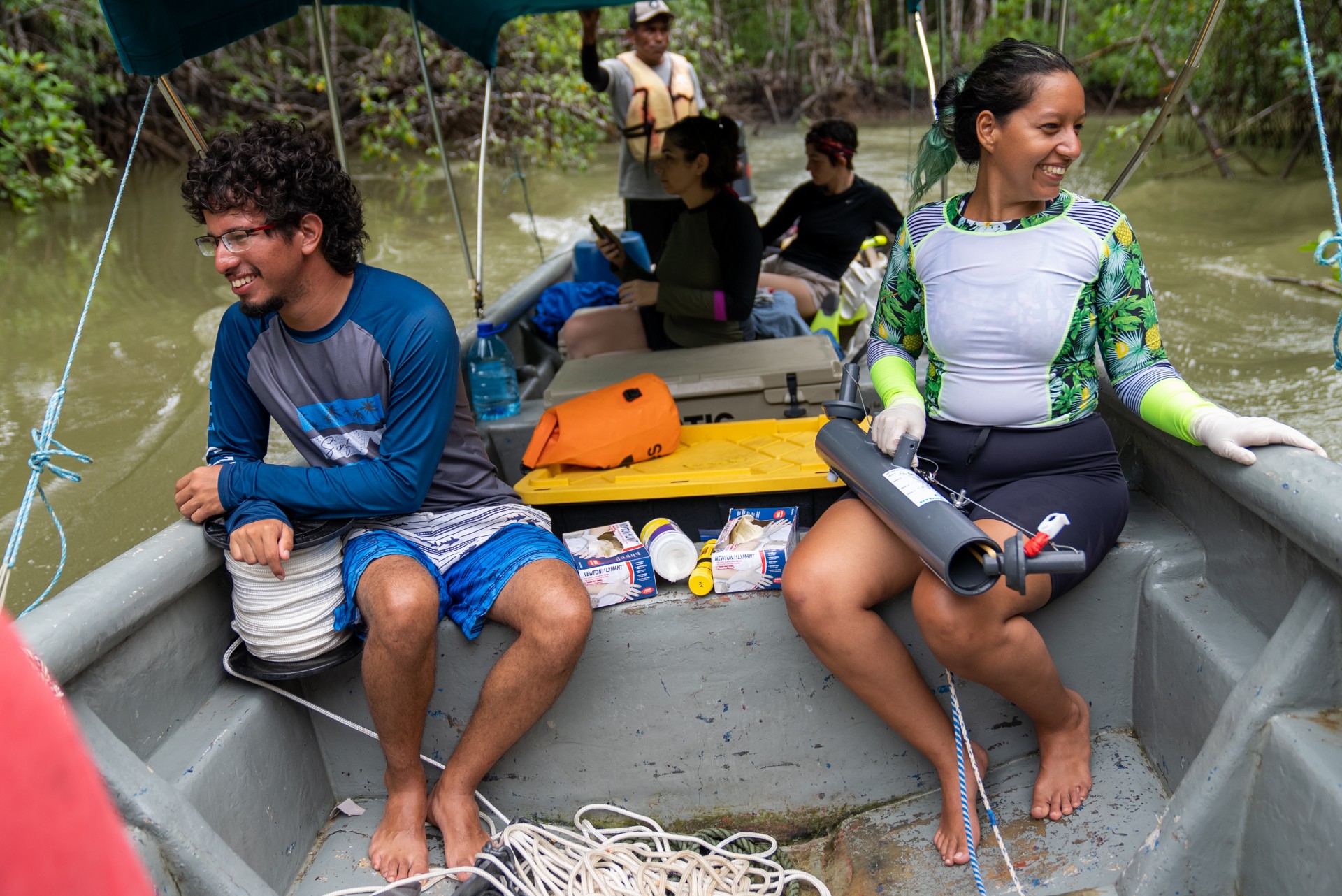 Decolonizing ocean science means ensuring local capacity and priorities to be a part of the science. The Smithsonian Tropical Research Institute offers many opportunities, including fellowships, field courses and internships, for ocean-related research and multidisciplinary collaboration, for a deeper understanding of marine ecosystems and the link between ocean and people. In the photo, STRI fellows Helio Quintero-Arrieta and Viviane Alí, from Panama, during a research project in the mangroves of the Coiba National Park. Credit: Ana Endara, STRI.
Decolonizing ocean science means ensuring local capacity and priorities to be a part of the science. The Smithsonian Tropical Research Institute offers many opportunities, including fellowships, field courses and internships, for ocean-related research and multidisciplinary collaboration, for a deeper understanding of marine ecosystems and the link between ocean and people. In the photo, STRI fellows Helio Quintero-Arrieta and Viviane Alí, from Panama, during a research project in the mangroves of the Coiba National Park. Credit: Ana Endara, STRI.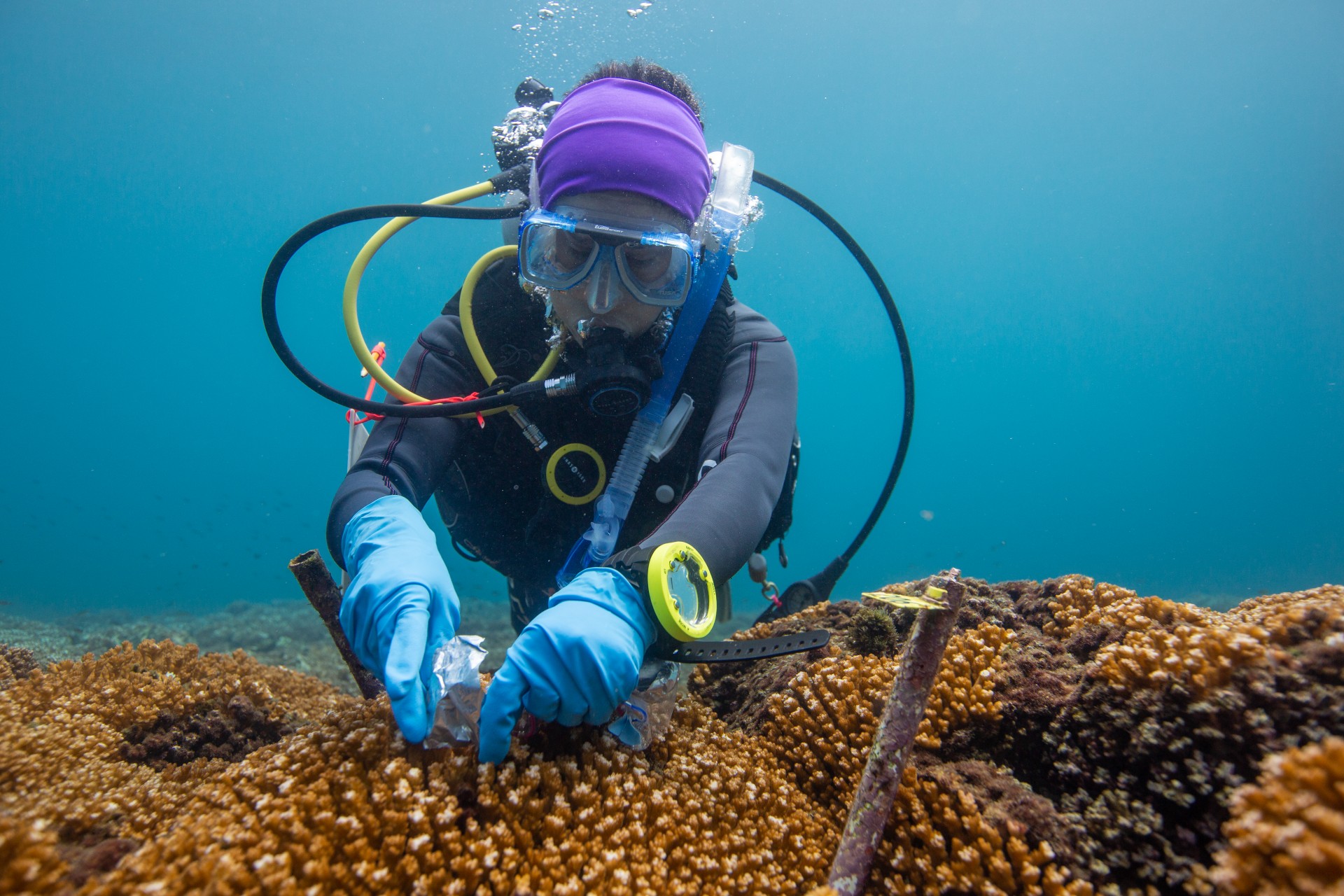
STRI fellow Diana Lopez from Colombia is conducting research on the coral reefs in Bahia Canales, in the Coiba National Park. Credit: Ana Endara, STRI.Next1/2“The conclusion I’d like to focus on is decolonizing ocean science, from who leads, to how it is done. This action is relevant to all scales and dimensions of ocean conservation: from individuals to institutions, theory to practice, and from our youth to our elders,” commented co-author Steven Mana’oakamai Johnson, from the Department of Natural Resources and the Environment at Cornell University.
Spalding and Grorud-Colvert committed themselves to creating a space for listening and challenging perspectives and ideas. “We can’t find solutions without open and honest and transdisciplinary conversations, and making sure that we are creating spaces for these to happen,” Grorud-Colvert added. During the in-person paper-writing workshops at Punta Culebra Nature Center in Panama City, Panama. Top, from left to right: Claire Paris-Limouzy, biological oceanographer and professor at the University of Miami; STRI’s Bocas del Toro Research Station director, Rachel Collin; marine data scientist and affiliate researcher at University of California Santa Barbara, Juan Mayorga; Alan Friedlander, chief scientist for the National Geographic Society’s Pristine Seas program and researcher at the University of Hawai’i; assistant professor at Cornell University, Steven Mana’oakamai Johnson; Oregon State University associate professor, Kirsten Grorud-Colvert; Cinda Scott, marine biologist and director of the School for Field Studies in Bocas del Toro; lab manager of Rachel Collin’s lab at STRI, Tania Romero; WorldFish Science Director, Edward Allison; and Daniel Suman, professor of marine policy and coastal management at the University of Miami. Bottom, from left to right: marine biologist and founder of Oceanswell, Asha de Vos; STRI staff scientist and founding director of the Adrienne Arsht Community-Based Resilience Solutions Initiative, Ana Spalding; and marine biologist and SpeSeas founder and director, Diva Amon. Credit: Vanessa Crooks, STRI.
During the in-person paper-writing workshops at Punta Culebra Nature Center in Panama City, Panama. Top, from left to right: Claire Paris-Limouzy, biological oceanographer and professor at the University of Miami; STRI’s Bocas del Toro Research Station director, Rachel Collin; marine data scientist and affiliate researcher at University of California Santa Barbara, Juan Mayorga; Alan Friedlander, chief scientist for the National Geographic Society’s Pristine Seas program and researcher at the University of Hawai’i; assistant professor at Cornell University, Steven Mana’oakamai Johnson; Oregon State University associate professor, Kirsten Grorud-Colvert; Cinda Scott, marine biologist and director of the School for Field Studies in Bocas del Toro; lab manager of Rachel Collin’s lab at STRI, Tania Romero; WorldFish Science Director, Edward Allison; and Daniel Suman, professor of marine policy and coastal management at the University of Miami. Bottom, from left to right: marine biologist and founder of Oceanswell, Asha de Vos; STRI staff scientist and founding director of the Adrienne Arsht Community-Based Resilience Solutions Initiative, Ana Spalding; and marine biologist and SpeSeas founder and director, Diva Amon. Credit: Vanessa Crooks, STRI.
Despite the different time zones and cultures, the collaborators were surprised to find that their experiences were not very different.
“It’s amazing how shared experiences lead to co-creating solutions for the global tropics. In East Asia and the Pacific and Africa and Latin America, we are all feeling similar things, and we feel validated by the folks from these regions,” Spalding said.
“Amplifying the voice of the tropical majority in ocean science and governance is key to making sure decisions related to the tropics include perspectives from key actors from the tropics,” stated co-author Josheena Naggea of the Oceans Department and Center for Ocean Solutions in Stanford University.
During Our Ocean Conference in Panama in March 2023, STRI highlighted the importance of scientific research to make realistic commitments to ocean conservation. In the photo: Ricardo de Ycaza, Science and Conservation Coordinator at STRI, with the publication co-authors Ana Spalding, Daniel Suman, and Andrés Cisneros-Montemayor. Credit: Jorge Alemán, STRI.
“Current scientific leaders need to realize that scientists in the tropics have been mostly ignored or marginalized for a very long time and we nevertheless are producing essential knowledge, and often in much more equitable ways,” said co-author Andrés Cisneros-Montemayor, Deputy Director at Ocean Nexus, and Assistant Professor at Simon Fraser University.
Researcher and co-author Estradivari, from the Ecology Department at Leibniz Center for Tropical Marine Research (ZMT) in Germany, said: “While there are real inequities in ocean governance and science that can have negative effects on ocean conservation, there are also solutions available, as long as we value diversity and flexibility and seize opportunities for change.”
List of Referenes
- Ana K. Spalding, Kirsten Grorud-Colvert, Edward H. Allison, Diva J. Amon, Rachel Collin, Asha de Vos, Alan M. Friedlander, Steven Mana’oakamai Johnson, Juan Mayorga, Claire B. Paris, Cinda Scott, Daniel O. Suman, Andrés M. Cisneros-Montemayor, Estradivari, Alfredo Giron-Nava, Georgina G. Gurney, Jean M. Harris, Christina Hicks, Sangeeta Mangubhai, Fiorenza Micheli, Josheena Naggea, David Obura, Juliano Palacios-Abrantes, Angelique Pouponneau, Rebecca Vega Thurber. Engaging the tropical majority to make ocean governance and science more equitable and effective. npj Ocean Sustainability, 2023; 2 (1) DOI: 10.1038/s44183-023-00015-9
Cite This Article as
No tags found for this post









